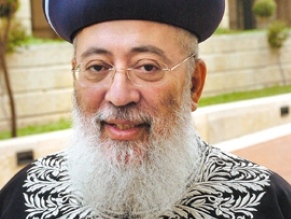|
World Jewish News

Rabbi Shlomo Amar
|
Israel Interior Ministry still letting Chief Rabbinate decide 'who is a Jew'
19.12.2011, Israel The Interior Ministry is continuing to condition the granting of citizenship to those who underwent Orthodox conversions abroad on the approval of the conversion by the Chief Rabbinate - despite agreements to the contrary.
Recently, applications for citizenship by two American converts under the Law of Return were refused because the Chief Rabbinate did not recognize the rabbinical court that converted them.
"We've reached a new low with respect to converts," declared Rabbi Seth Farber, director of Itim, the Jewish Life Information Center, which received both complaints.
Ironically, while Reform and Conservative conversions performed abroad must be recognized by the Interior Ministry as per a 1988 High Court of Justice decision, people undergoing Orthodox conversions - particularly those performed by non-ultra-Orthodox rabbis - have had problems.
In February, Thomas Dohlan, a Canadian citizen married to an Israeli, applied to immigrate after undergoing an Orthodox conversion. His application was refused because the rabbinate did not recognize the court that converted him. Dohlan waged an intense campaign and won his battle for citizenship.
But his story exposed a broader phenomenon: of the Interior Ministry giving the Chief Rabbinate unprecedented authority to determine "Who is a Jew" abroad. In the past, the only body determining whether a community was "recognized," or whether conversions had been properly performed was the Jewish Agency.
The Knesset held two debates on the issue, and under the threat of a petition to the High Court, a procedural agreement was reached, signed by ministry's Population and Immigration Authority head Amnon Ben Ami.
This agreement states that, "In the decisive majority of cases" the authority to determine whether a conversion was carried out properly in a "recognized community" lay with the Jewish Agency, and it was responsible for recommending whether a convert was eligible to immigrate under the Law of Return, as it does for Jews by birth.
According to the agreement, "in the few cases where there is a doubt regarding the identity of the converting rabbi, if it emerges that the chief rabbi does not recognize the conversion ... the Jewish Agency will be asked for clarifications regarding the community and its institutions" before a decision is made by the Population and Immigration Authority.
But this was not the case with the two people Itim dealt with, both American converts who underwent lengthy Orthodox conversions.
Neither wished to be identified and only one agreed to tell her story, under an assumed name. "Ruth," a doctoral student, said she became curious about Judaism after meeting Jews during her travels, and arranged to spend long periods in Israel in the framework of her studies.
A few years ago, she affiliated herself with a Manhattan congregation, and began studying Judaism seriously with its rabbi. After a year of rigorous study, the community's rabbinical court approved her conversion.
A few months ago she arrived in Israel for another stay, but this time the Interior Ministry refused to renew her student visa, suggesting that if she wanted to remain, she had to submit an application to immigrate under the Law of Return. She did so - and the application was refused.
The Jewish Agency told Haaretz that it had approved the conversion. But apparently the Interior Ministry, which consulted the Chief Rabbinate, decided otherwise.
In a letter dated November 1, the ministry said Ruth must leave the country by November 14, but the letter only reached her on November 16. More to the point, the letter reveals an apparent deviation from the procedures described above.
"According to ... the Chief Rabbinate, this is a conversion that is not recognized for the purpose of obtaining status in Israel," the letter reads - although as noted, the Jewish Agency had approved the conversion.
"Despite the new procedure, the clerks in the Population Authority are continuing to do as they please," said Itim's Farber. "I don't know who's giving them their instructions: If it's coming from above, it's a catastrophe, and if they are doing these things independently, then it's even more serious.
"If the ministry doesn't allow Orthodox converts to receive [citizenship], we will go to court to make sure the agreement is being upheld," he added.
The Population and Immigration Authority said: "The case in question is being examined ... and the authority will act in accordance with all agreements, among them what appears in the letter," written by Ben Ami in June.
The seeming absurdity of putting foreign Orthodox converts through closer scrutiny than Reform and Conservative ones actually stems from the High Court decision in 1988, which left the decision on approval of Orthodox converts to the Interior Ministry.
Knowledgeable sources say that since Orthodox communities abroad are diverse and don't answer to one central body, evaluating their converts is complex. Sephardic Chief Rabbi Shlomo Amar told the Knesset's Immigration and Diaspora Affairs Committee that Orthodox converts must be scrutinized, particularly after a few well-publicized cases of Orthodox rabbis "converting" people in return for bribes.
In general, when it comes to North America, the Chief Rabbinate is prepared to accept conversions done under Haredi auspices or those of the Rabbinical Council of America - but not by other Orthodox organizations such as the International Rabbinic Fellowship.
Haaretz.com
|
|
